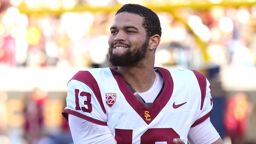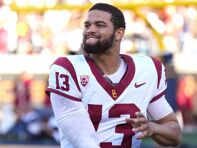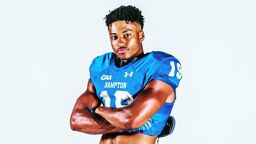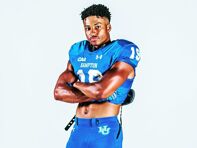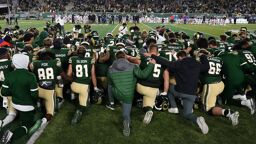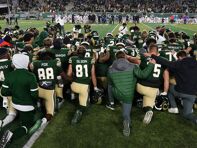“Aaron, if you don’t do something about this, you will never reach your potential.”
Those were words of caution from my close friend Justin when I told him my biggest secret. And they largely led to me sharing my story with you today.
I have never really been fully comfortable in my own skin. I was born and raised in a conservative El Paso, Texas, household and I come from Mexican heritage. Add being Catholic into the mix and you don’t exactly have a recipe for success as a gay kid. I was taught that homosexuality was wrong, and I acted accordingly: I swept it under the rug for the next 15 years of my life.
When you suppress your identity for so long, you need some distractions along the way. My favorite distraction growing up just so happened to be the Dallas Cowboys, and in turn, the sport of football. I loved everything about the sport: the pageantry, the big hits, the loud crowds, and most importantly the lessons learned from a team setting.
While I was not blessed with athletic genes to turn in anything past a middle school career, I still always gravitated towards all things football. When I think about it, one of the biggest deciding factors for my college choice was the football tradition at the University of Notre Dame.
Football is a great equalizer. All my worries in life disappear with football. Football unites or divides people in only one way: who wins the game. I love this about the game. I also loved that it made me forget about being gay. Whenever I was at a game or talking with friends about the Cowboys, I would have an ethereal feeling of belonging. The feelings of masculinity and camaraderie dissipated my worries about my sexuality. The feeling was so intoxicating that I decided to make a career out of the game.
I am now an NCAA administrator in college football. My core responsibility is to build relationships with college football stakeholders, particularly football coaches. My specific clients are the Big 12 Conference and American Athletic Conference schools. I travel America building relationships with these schools. It is a dream job for someone who lives, eats, and breathes college football.
Trust is the central component of my job. A primary reason for building these relationships is to get my finger on the pulse of recruiting in college football—and all the bad behavior that goes on in that world. Think of my role as intelligence for the NCAA. I rely on people to share very sensitive information with me to help clean up recruiting. They worry about being exposed for turning in bad apples in college football, and so it takes time to build up this trust.
My job totally relies on trust, and I am pretty good at building trust.
My job totally relies on trust, and I am pretty good at building trust.
But there is an inconvenient reality for me: homosexuality in this industry remains a perceived taboo. This was made clear when I first started at the NCAA. In 2014 I was traveling for work and met an industry “insider,” a decision-maker in football. We were in his office and he spoke about how hard it would be for a football program to deal with a gay guy in the building.
“I just don’t think football is ready for people who make those choices,” he said. “The locker room, the boosters, the fans—nobody wants to see a guy with a guy. Football is wins and losses, and that gets in the way.”
I took this person’s observations to heart and would keep my sexuality hidden for the rest of my life. I refused to be a distraction. I would not erode trust with my football coaches.
But then life happened. A dear friend committed suicide. Mom got cancer. God spoke to me and said it was time to start living life openly—so I started coming out in my personal life in 2015. Reactions ran the gamut from the funny to inspiring to some of the worst things people have ever told me—but this was my personal life, not my professional life. I remained steadfast in keeping the two separate, and I stayed in the closet.
Back to Justin. Justin works in college sports. He is also a great friend of mine. I visited him for a weekend of football and I decided it was time to tell him. I was so nervous about losing him as a friend.
We were sitting in his living area when he was about to go to bed.
“Justin, I want to talk about something.” I spilled my life story, much to his surprise. I must have talked for 30 minutes straight. I told him about my fears in college football. About being a distraction. About failure in my career.
Justin finally got a word in. Amidst telling me he loved me and was so happy to be my friend, I could sense his genuine empathy.
“You are clearly shaken by this and I hate it,” he said. “I hate that you are living every day with this burden. It is clearly impacting you. You need to bring your full self to work every day. Aaron, if you don’t do something about this, you will never reach your potential.”
I prayed a lot about this. A life lived mostly in truth had a cancerous tumor in the background. Justin was right. It was time to live openly in my professional life. I had to bring my full self to work.

I searched for resources in college football who could guide me. I searched for openly gay men in football-specific administrator roles. None. I searched for openly gay coaches in college football. Couldn’t find any. I found some players, but no coaches or administrators. I got in touch with an expert in LGBT issues in athletics, former Nebraska football player Eric Lueshen, and he didn’t know any openly gay men with a career in college football.
I couldn’t find any openly gay men at my workplace, either—an organization of 500-plus people in college sports. This left me lonely and depressed. Being a “distraction” in this industry seemed to be self-fulfilling prophecy: It is taboo to be an openly gay man in college football, because there are no openly gay men working in college football.
But Eric offered perspective: “You have an opportunity. You can be the resource you wish was there for you.”
Eric was right. I hated how I felt when I could not find an openly gay man in college football. I could help change that. This could be God’s plan for my life. Maybe it was time to make this publicly known.
But my central fear remained: trust. Would this news sink my career? Would coaches treat me differently? Most importantly, would they trust me now?
I am close to a particular FBS football coach and I wanted to break my news to him personally. I asked him for some time to speak on the phone. I was at a friend’s house in Memphis when I had to step out to take a call. It was coach.
I was the most nervous I had ever been in my professional career during that phone call. This was it—no un-ringing the bell now. My shirt was drenched in sweat and the phone was shaking so much that I had to stabilize it with my other hand at several points during the conversation.
And then the unthinkable happened. When I finished, he said he was proud of me. He said I was his “friend,” not just someone he worked with, and that would never change. He said he respected how well I treated him and people generally. He said I have a bright future in college football.
He said if me being gay was a “distraction” for a program trying to win games, then they probably were not on track to being a winner anyway. He called me a winner and a star.
There are a lot of solid people in football who have treated me really well.
This coach, at the epicenter of an industry with seemingly homophobic tendencies, did more to lift me up in those 30 minutes on the phone than anyone else ever had. I was worried about keeping his trust and being able to do my job. I found he just didn’t trust me—he respected me. He valued me.
Now begins the next chapter of life: how football responds to an openly gay man. I have been paralyzed by fear for my entire professional life about the consequences of being a “distraction.” But coach gave me hope that the taboo of my sexuality has been left in the past. There are a lot of solid people in football who have treated me really well.
I used to think this would change if they ever found out I was gay. Coach showed me differently.
Aaron Hernandez is Assistant Director of Enforcement – Football Development at the NCAA. He is a 2010 graduate from the University of Notre Dame and 2013 graduate of Marquette University Law School. He can be reached at [email protected] and on Twitter at @QuanHernandez.
For more college football news, visit SB Nation.


